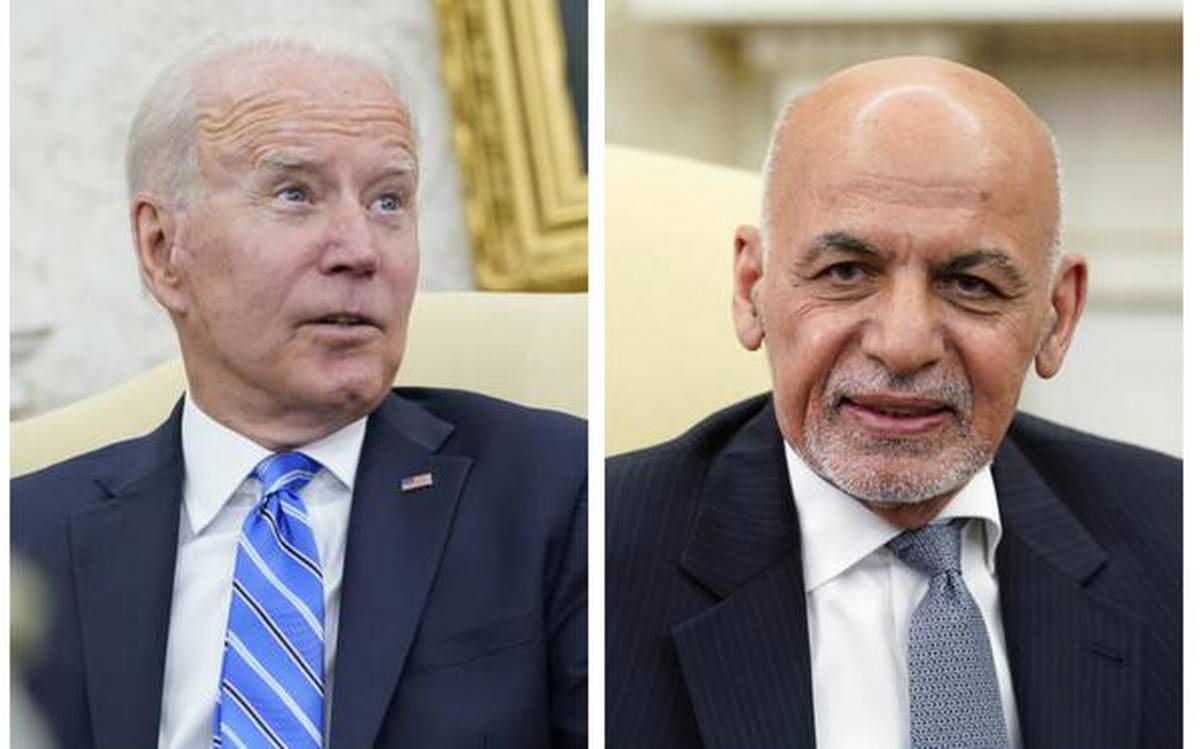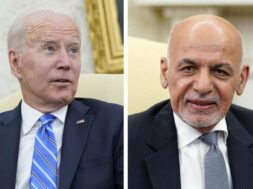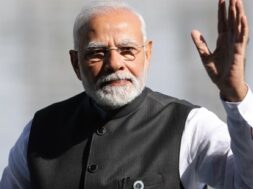
Joe Biden-Ashraf Ghani Failed to Assess Taliban Capabilities
Manas Dasgupta
NEW DELHI, Sept 1: Twenty-three days before the Taliban took over Kabul running over entire Afghanistan in a rapid speed, the deposed president Ashraf Ghani had told his US counterpart Joe Biden that his army was facing “a full-scale invasion” from Taliban “aided by 10-15,000 international terrorists, predominantly Pakistanis.”
In a telephonic conversation between the two presidents on July 23, which also happened to be the last call to Biden from Ghani before he fled the country on August 15, the day the Taliban entered Kabul, the leaders discussed military aid, political strategy and messaging tactics, but neither Biden nor Ashraf Ghani appeared aware of or prepared for the immediate danger of the entire country falling to insurgents.
“We are facing a full-scale invasion, composed of Taliban, full Pakistani planning and logistical support, and at least 10-15,000 international terrorists, predominantly Pakistanis thrown into this,” Ghani told Biden, a transcript of the telephonic conversation revealed. Afghan government officials, and U.S. experts, have consistently pointed to Pakistani support for the Taliban as key to the group’s resurgence.
Pakistan, however, has emphatically denied it any way aided the Taliban in over-running Afghanistan. The Pakistani Embassy in Washington claimed, “Clearly the myth of Taliban fighters crossing from Pakistan is unfortunately an excuse and an afterthought peddled by Mr. Ashraf Ghani to justify his failure to lead and govern.”
The conversation between the two leaders clearly indicated that neither of them anticipated the massive insurrection and collapse to come so soon. “We are going to continue to fight hard, diplomatically, politically, economically, to make sure your government not only survives, but is sustained and grows,” said Biden.
The US president believed that the two sides were fighting an uneven battle and the victory of the official Afghan forces beating back the advancing Taliban was a forgone conclusion. Lauding the Afghan armed forces, which were trained and funded by the U.S. government, he told Ghani, “You clearly have the best military. You have 300,000 well-armed forces versus 70-80,000 and they’re clearly capable of fighting well.” But within a few days the Afghan military started folding across provincial capitals in the country with little fight against the Taliban.
Biden, however, while promising “continued assistance” to the Ghani government against the Taliban uprising, insisted on the Afghanistan government making efforts” for changing the “perception” around the world about Afghan forces and the performance of the political government. In much of the 14 minutes call, Biden focused on the Afghan government’s “perception” problem. “I need not tell you the perception around the world and in parts of Afghanistan, I believe, is that things are not going well in terms of the fight against the Taliban,” Biden said. “And there is a need, whether it is true or not, there is a need to project a different picture.”
Biden told Ghani that if Afghanistan’s prominent political figures were to give a press conference together, backing a new military strategy, “that will change perception, and that will change an awful lot I think.”
Afghanistan was promising a shift in its military strategy, to start focusing on protecting “population centers” – major cities – rather than fighting to protect rural territories. Biden referred approvingly of that strategy. He said doing so would help not just on the ground but in the “perception” internationally that was required to shore up world support for the Afghan government.
“I’m not a military guy, so I’m not telling you what a plan should precisely look like, you’re going to get not only more help, but you’re going to get a perception that is going to change …,” Biden said.
Ghani, for his part, assured Biden that “your assurance of support goes a very long way to enable us, to really mobilize us in earnest.”
In the call, Biden offered aid if Ghani could publicly project he had a plan to control the spiraling situation in Afghanistan. “We will continue to provide close air support, if we know what the plan is.” Days before the call, the U.S. carried out air strikes to support Afghan security forces, a move the Taliban said was in violation of the Doha peace agreement.
After the call, the White House released a statement that focused on Biden’s commitment to supporting Afghan security forces and the administration seeking funds for Afghanistan from Congress. Ghani told Biden he believed there could be peace if he could “rebalance the military solution.” But he added, “We need to move with speed.”
By the time of the call, the US was well into its planned withdrawal from Afghanistan, which Biden had postponed from the May date set by his predecessor, Donald Trump. The U.S. military had closed its main Afghanistan air base, at Bagram, in early July. As the two presidents spoke, Taliban insurgents controlled about half of Afghanistan’s district centers, indicating a rapidly deteriorating security situation.
In a little over two weeks after Biden’s call with Ghani, the Taliban captured several provincial Afghan capitals and the US, which earlier promised “all assistance,” said it was up to the Afghan security forces to defend the country. “These are their military forces, these are their provincial capitals, their people to defend,” Pentagon spokesman John Kirby said on August 9.
On August 11, U.S. intelligence reports indicated Taliban fighters could isolate Afghanistan’s capital in 30 days and possibly take it over within 90. Instead, the fall happened in less than a week.
But refuting the national and international criticism of an “unplanned Withdrawal” by the US troops giving advantage to the terror forces, the US President has continued to defend his decision. In his address to the nation from the White House on Tuesday night, Biden said withdrawing the troops from Afghanistan to end the 20-year war was the “best” and the “right” decision for America.
He said there was no reason to continue in a war that was no longer in the service of the “vital national interest” of the American people. “I give you my word: With all of my heart, I believe this is the right decision, a wise decision, and the best decision for America,” Biden said
The Biden-Ghani call also underscored persistent political infighting that plagued the Afghan government. When Biden asked him to include former Afghan President Hamid Karzai in a press conference, Ghani pushed back. “Karzai would not be helpful,” he said. “He is contrary, and time is of the essence, we cannot bring every single individual … We have tried for months with President Karzai. Last time we met for 110 minutes; he was cursing me and he was accusing me of being a U.S. lackey.”
In a follow-up call later that day that did not include the U.S. president, Biden’s National Security Advisor Jake Sullivan, General Mark Milley and U.S. Central Command commander General Frank McKenzie spoke to Ghani. In this call, too, an area of focus was the global perception of events on the ground in Afghanistan. Milley, chairman of the Joint Chiefs of Staff, told Ghani “the perception in the United States, in Europe and the media sort of thing is a narrative of Taliban momentum, and a narrative of Taliban victory. And we need to collectively demonstrate and try to turn that perception, that narrative around. I do not believe time is our friend here. We need to move quickly,” McKenzie said.
With the last of the US troop withdrawn from Afghanistan, the hardline Islamist Taliban celebrated their total return to power with gunfire and diplomacy, now to face a daunting challenge of transforming itself from an insurgent group to a government in a war-ravaged nation that largely dependent on foreign aid.
The US last week issued a license authorizing it and its partners to continue to facilitate humanitarian aid in Afghanistan, a Treasury Department official said, after the Taliban, which is blacklisted by Washington, seized control of the country this month. The specific license, issued by the Treasury Department last Wednesday, authorizes the U.S. government and its contractors to support humanitarian assistance to people in Afghanistan, including the delivery of food and medicine, despite U.S. sanctions on the Taliban.
The U.S. Senate also passed legislation on Tuesday to provide aid for American civilians returning from Afghanistan, sending the bill to the White House where President Joe Biden signed it into law, as congressional Republicans criticized the president over the chaotic withdrawal from Kabul.
The “Emergency Repatriation Assistance for Returning Americans Act” provides $10 million in emergency funds per year this year and next, to help returning Americans with basic necessities as they adjust to life back home. The measure had already passed the U.S. House of Representatives.
The US said its mission to get Americans out of Afghanistan would continue even after the complete withdrawal. Jake Sullivan said it was just that the evacuation effort “has shifted from a military mission to a diplomatic mission.” He cited “considerable leverage” the U.S. has over the Taliban to get out any remaining Americans — a number that U.S. official have said was under 200.
The UK government is in discussions with the Taliban to secure safe passage for remaining British nationals and eligible Afghan evacuees and has launched “Operation Warm Welcome” for refugees from Afghanistan, Downing Street said on Wednesday.
The talks, involving UK officials and “senior” Taliban members, are said to be taking place in Doha, Qatar, and additionally, Britain is also sending 15 “crisis response specialists” to neighbouring Pakistan, Uzbekistan and Tajikistan to assist British diplomats in their work to allow people to reach the UK via third countries. The focus is on helping UK nationals, interpreters and other Afghans who were employed by the UK.
France said “a few dozen” French nationals remain in Afghanistan, including some who wanted to be evacuated but could not as the last flight left Kabul. Defense Ministry spokesman Herve Grandjean said in a news conference on Tuesday that “all efforts are being done” to allow those left behind to get “a safe and orderly evacuation.” He said “that is the goal of the talks under way within the United Nations framework with the Taliban power.” In addition, France was not able to evacuate a “few dozen” former Afghan employees of the French army who asked for the protection of the country, he said.
A plane carrying 175 Afghans fleeing their strife-torn homeland arrived in Mexico on Tuesday night on one of the last flights to leave Kabul on the day U.S. forces completed the withdrawal. It was the fourth group of Afghan civilians granted entry by Mexico on humanitarian grounds. A foreign ministry statement said the latest group to arrive included independent journalists and activists accompanied by their families, including 75 children.
After the US withdrew its troops from Afghanistan bringing to an end its longest war in history, an influential Indian-American lawmaker has said India and the US could assist each other in the fight against terrorism.
Indian-American Congressman Raja Krishnamoorthi said the US should continue its counter-terrorism mission in Afghanistan so that it would not become a safe haven for terror groups like ISIS and Al-Qaeda. “India and U.S. can collaborate in fight against terrorism in many ways, including through intelligence gathering and sharing, and also assisting each other with augmenting capabilities to act against terrorists and thwart their plots,” he said.
Pakistan, meanwhile, is feeling concern over its own security situation as the Taliban tries to form a government and stabilise the country following the departure of US and other foreign forces. Islamabad is particularly worried about militant fighters from a separate, Pakistani Taliban group crossing from Afghanistan and launching lethal attacks on its territory.
“The next two to three months are critical,” a senior Pakistani official said, adding that Islamabad feared a rise in militant attacks along the Afghan-Pakistan border, as the Taliban tried to fill a vacuum left by the collapse of Afghan forces and the Western-backed administration.













